HA 3011 Advanced Financial Accounting: IFRS, Regulations and Analysis
VerifiedAdded on 2023/06/12
|11
|2739
|73
Report
AI Summary
This report delves into several key aspects of advanced financial accounting. It begins by examining the challenges posed by differing financial reporting standards in the global market and assesses the effectiveness of the Conceptual Framework developed by the FASB and IASB in achieving comparability. The report critiques the qualitative characteristics of financial reporting, such as relevance, faithful representation, comparability, understandability, timeliness, and verifiability, highlighting areas where they fall short of their objectives. It also explores the Public Interest Theory, Capture Theory, and Economic Interest Group Theory in the context of regulation. Furthermore, the report analyzes FASB Statement No. 144 and its impact on financial reporting, emphasizing its contributions to relevance and faithful representation. Finally, it discusses the preference of directors for the cost model over the revaluation model, the effects of not revaluing assets, and the adverse impact on shareholder wealth.
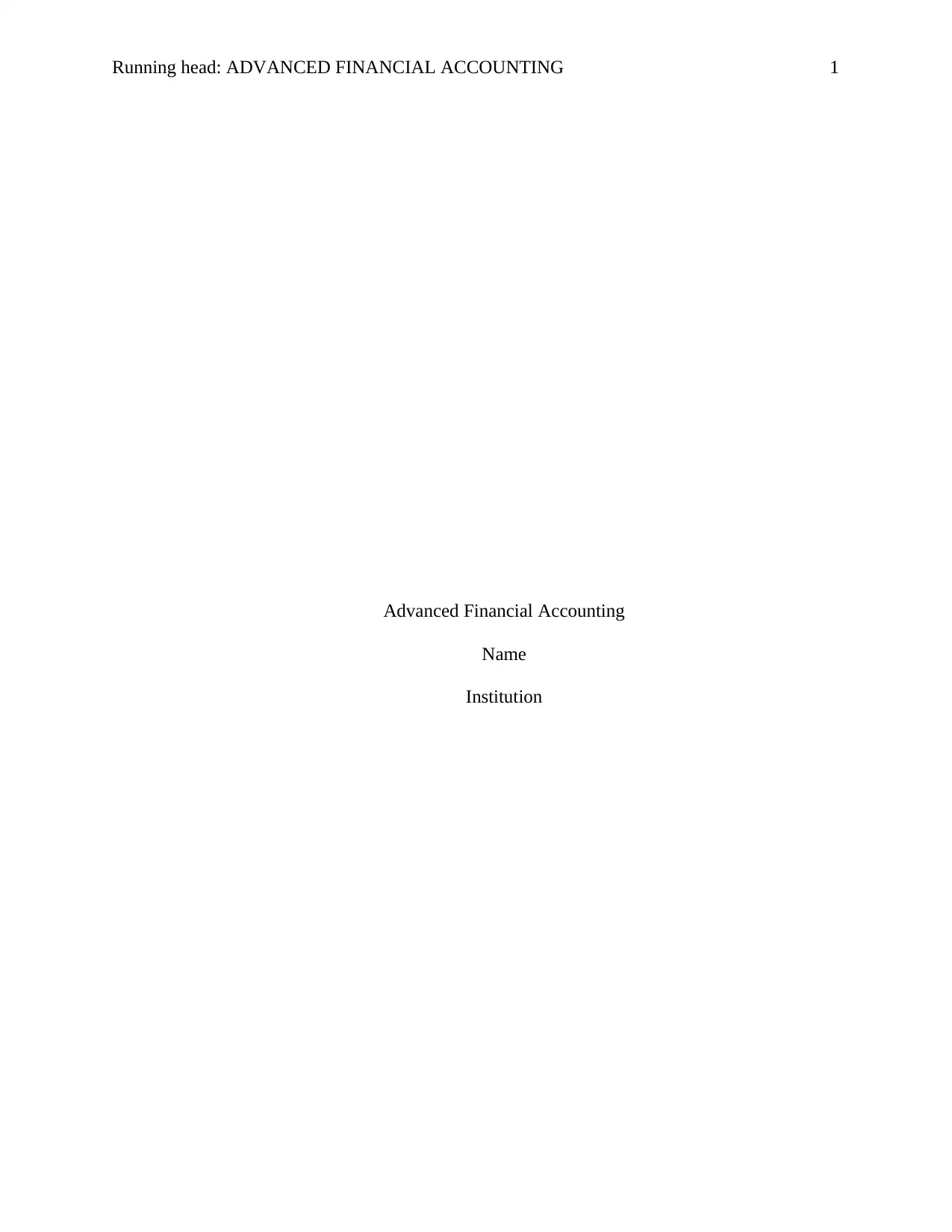
Running head: ADVANCED FINANCIAL ACCOUNTING 1
Advanced Financial Accounting
Name
Institution
Advanced Financial Accounting
Name
Institution
Paraphrase This Document
Need a fresh take? Get an instant paraphrase of this document with our AI Paraphraser
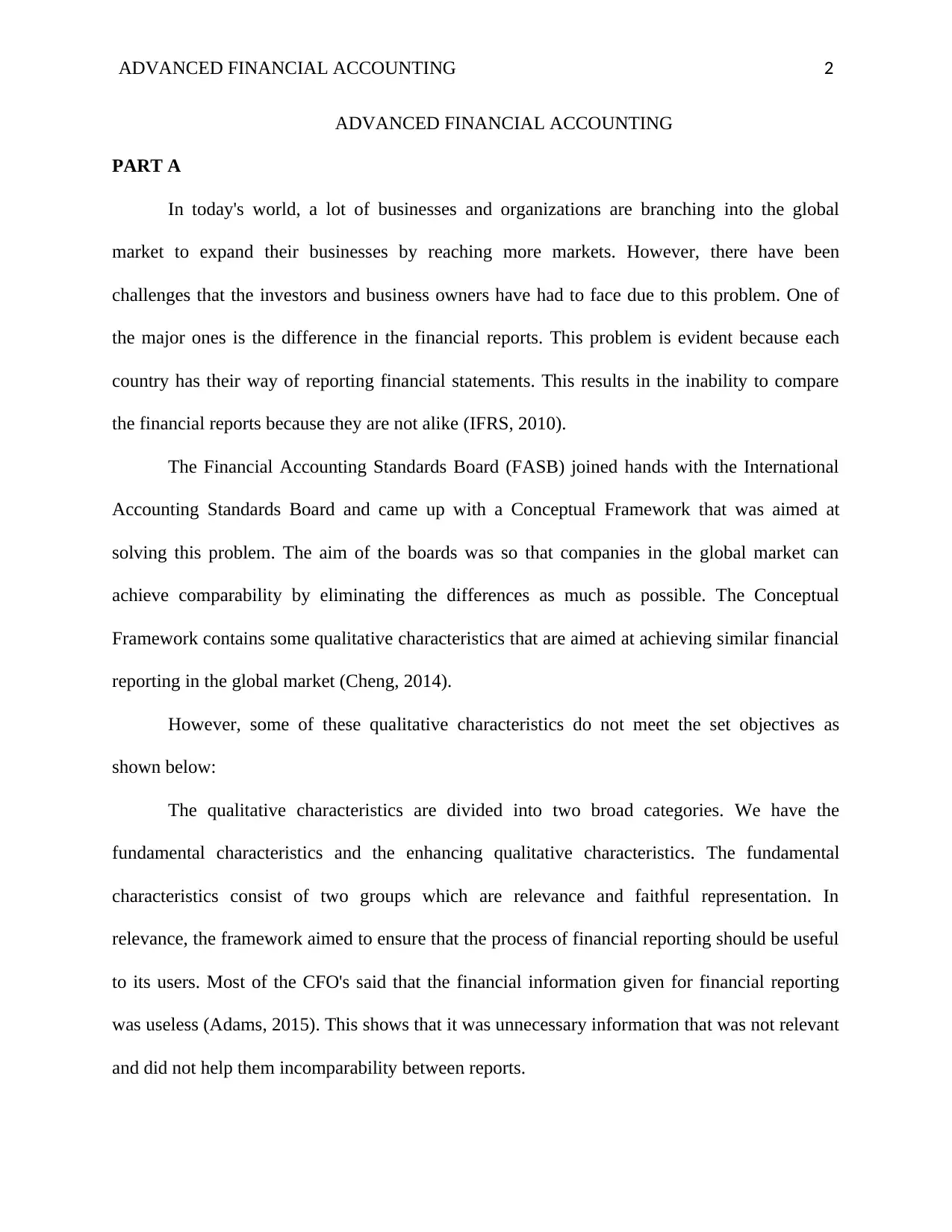
ADVANCED FINANCIAL ACCOUNTING 2
ADVANCED FINANCIAL ACCOUNTING
PART A
In today's world, a lot of businesses and organizations are branching into the global
market to expand their businesses by reaching more markets. However, there have been
challenges that the investors and business owners have had to face due to this problem. One of
the major ones is the difference in the financial reports. This problem is evident because each
country has their way of reporting financial statements. This results in the inability to compare
the financial reports because they are not alike (IFRS, 2010).
The Financial Accounting Standards Board (FASB) joined hands with the International
Accounting Standards Board and came up with a Conceptual Framework that was aimed at
solving this problem. The aim of the boards was so that companies in the global market can
achieve comparability by eliminating the differences as much as possible. The Conceptual
Framework contains some qualitative characteristics that are aimed at achieving similar financial
reporting in the global market (Cheng, 2014).
However, some of these qualitative characteristics do not meet the set objectives as
shown below:
The qualitative characteristics are divided into two broad categories. We have the
fundamental characteristics and the enhancing qualitative characteristics. The fundamental
characteristics consist of two groups which are relevance and faithful representation. In
relevance, the framework aimed to ensure that the process of financial reporting should be useful
to its users. Most of the CFO's said that the financial information given for financial reporting
was useless (Adams, 2015). This shows that it was unnecessary information that was not relevant
and did not help them incomparability between reports.
ADVANCED FINANCIAL ACCOUNTING
PART A
In today's world, a lot of businesses and organizations are branching into the global
market to expand their businesses by reaching more markets. However, there have been
challenges that the investors and business owners have had to face due to this problem. One of
the major ones is the difference in the financial reports. This problem is evident because each
country has their way of reporting financial statements. This results in the inability to compare
the financial reports because they are not alike (IFRS, 2010).
The Financial Accounting Standards Board (FASB) joined hands with the International
Accounting Standards Board and came up with a Conceptual Framework that was aimed at
solving this problem. The aim of the boards was so that companies in the global market can
achieve comparability by eliminating the differences as much as possible. The Conceptual
Framework contains some qualitative characteristics that are aimed at achieving similar financial
reporting in the global market (Cheng, 2014).
However, some of these qualitative characteristics do not meet the set objectives as
shown below:
The qualitative characteristics are divided into two broad categories. We have the
fundamental characteristics and the enhancing qualitative characteristics. The fundamental
characteristics consist of two groups which are relevance and faithful representation. In
relevance, the framework aimed to ensure that the process of financial reporting should be useful
to its users. Most of the CFO's said that the financial information given for financial reporting
was useless (Adams, 2015). This shows that it was unnecessary information that was not relevant
and did not help them incomparability between reports.
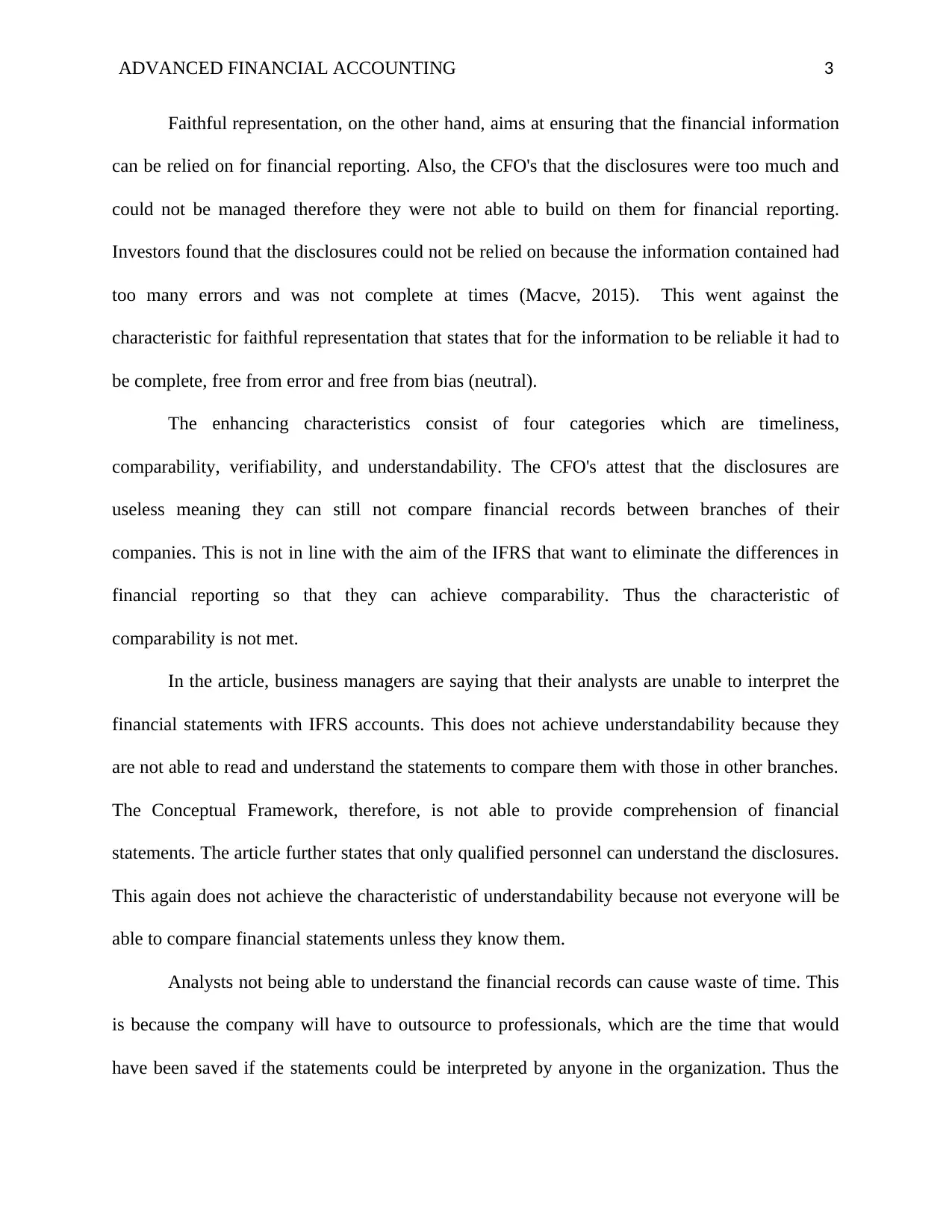
ADVANCED FINANCIAL ACCOUNTING 3
Faithful representation, on the other hand, aims at ensuring that the financial information
can be relied on for financial reporting. Also, the CFO's that the disclosures were too much and
could not be managed therefore they were not able to build on them for financial reporting.
Investors found that the disclosures could not be relied on because the information contained had
too many errors and was not complete at times (Macve, 2015). This went against the
characteristic for faithful representation that states that for the information to be reliable it had to
be complete, free from error and free from bias (neutral).
The enhancing characteristics consist of four categories which are timeliness,
comparability, verifiability, and understandability. The CFO's attest that the disclosures are
useless meaning they can still not compare financial records between branches of their
companies. This is not in line with the aim of the IFRS that want to eliminate the differences in
financial reporting so that they can achieve comparability. Thus the characteristic of
comparability is not met.
In the article, business managers are saying that their analysts are unable to interpret the
financial statements with IFRS accounts. This does not achieve understandability because they
are not able to read and understand the statements to compare them with those in other branches.
The Conceptual Framework, therefore, is not able to provide comprehension of financial
statements. The article further states that only qualified personnel can understand the disclosures.
This again does not achieve the characteristic of understandability because not everyone will be
able to compare financial statements unless they know them.
Analysts not being able to understand the financial records can cause waste of time. This
is because the company will have to outsource to professionals, which are the time that would
have been saved if the statements could be interpreted by anyone in the organization. Thus the
Faithful representation, on the other hand, aims at ensuring that the financial information
can be relied on for financial reporting. Also, the CFO's that the disclosures were too much and
could not be managed therefore they were not able to build on them for financial reporting.
Investors found that the disclosures could not be relied on because the information contained had
too many errors and was not complete at times (Macve, 2015). This went against the
characteristic for faithful representation that states that for the information to be reliable it had to
be complete, free from error and free from bias (neutral).
The enhancing characteristics consist of four categories which are timeliness,
comparability, verifiability, and understandability. The CFO's attest that the disclosures are
useless meaning they can still not compare financial records between branches of their
companies. This is not in line with the aim of the IFRS that want to eliminate the differences in
financial reporting so that they can achieve comparability. Thus the characteristic of
comparability is not met.
In the article, business managers are saying that their analysts are unable to interpret the
financial statements with IFRS accounts. This does not achieve understandability because they
are not able to read and understand the statements to compare them with those in other branches.
The Conceptual Framework, therefore, is not able to provide comprehension of financial
statements. The article further states that only qualified personnel can understand the disclosures.
This again does not achieve the characteristic of understandability because not everyone will be
able to compare financial statements unless they know them.
Analysts not being able to understand the financial records can cause waste of time. This
is because the company will have to outsource to professionals, which are the time that would
have been saved if the statements could be interpreted by anyone in the organization. Thus the
⊘ This is a preview!⊘
Do you want full access?
Subscribe today to unlock all pages.

Trusted by 1+ million students worldwide
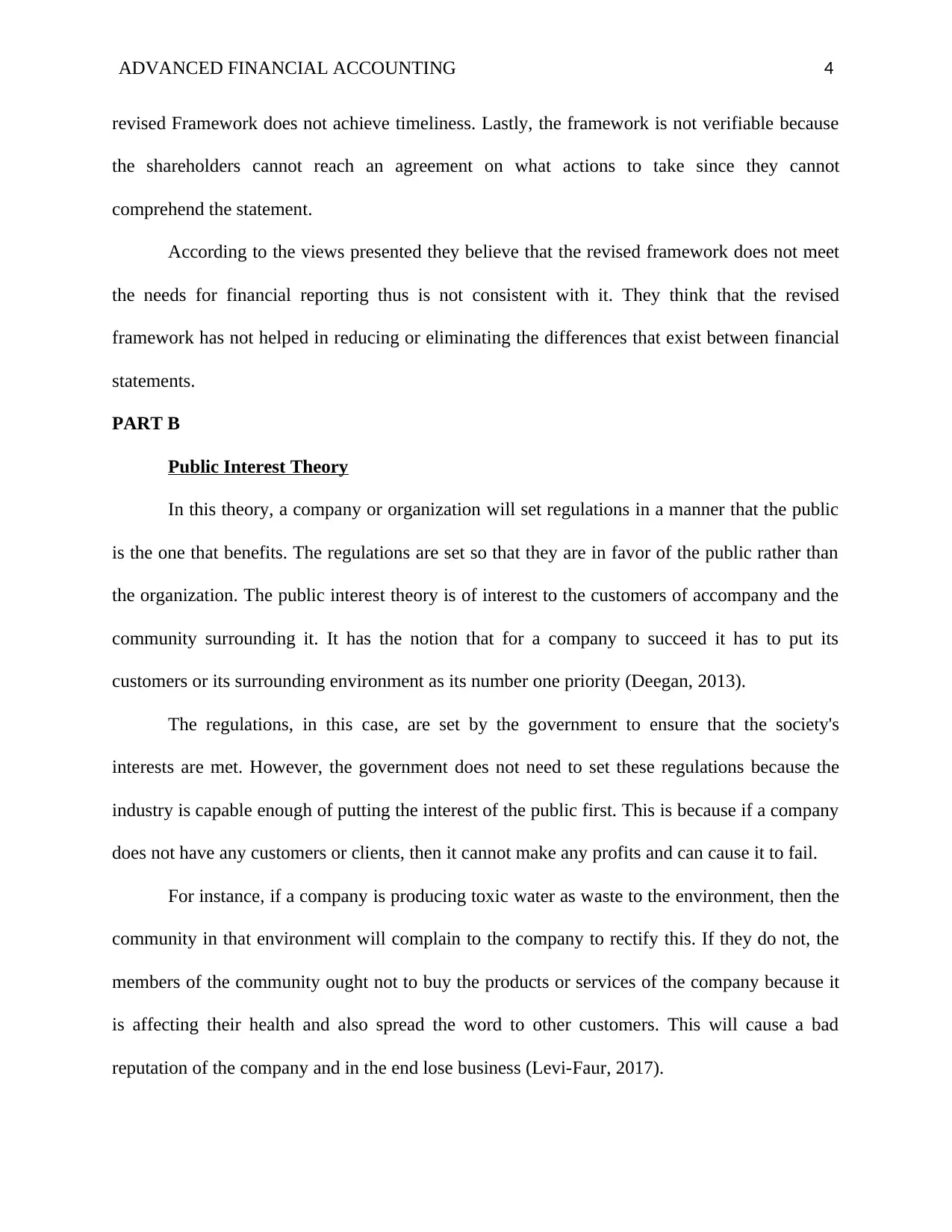
ADVANCED FINANCIAL ACCOUNTING 4
revised Framework does not achieve timeliness. Lastly, the framework is not verifiable because
the shareholders cannot reach an agreement on what actions to take since they cannot
comprehend the statement.
According to the views presented they believe that the revised framework does not meet
the needs for financial reporting thus is not consistent with it. They think that the revised
framework has not helped in reducing or eliminating the differences that exist between financial
statements.
PART B
Public Interest Theory
In this theory, a company or organization will set regulations in a manner that the public
is the one that benefits. The regulations are set so that they are in favor of the public rather than
the organization. The public interest theory is of interest to the customers of accompany and the
community surrounding it. It has the notion that for a company to succeed it has to put its
customers or its surrounding environment as its number one priority (Deegan, 2013).
The regulations, in this case, are set by the government to ensure that the society's
interests are met. However, the government does not need to set these regulations because the
industry is capable enough of putting the interest of the public first. This is because if a company
does not have any customers or clients, then it cannot make any profits and can cause it to fail.
For instance, if a company is producing toxic water as waste to the environment, then the
community in that environment will complain to the company to rectify this. If they do not, the
members of the community ought not to buy the products or services of the company because it
is affecting their health and also spread the word to other customers. This will cause a bad
reputation of the company and in the end lose business (Levi-Faur, 2017).
revised Framework does not achieve timeliness. Lastly, the framework is not verifiable because
the shareholders cannot reach an agreement on what actions to take since they cannot
comprehend the statement.
According to the views presented they believe that the revised framework does not meet
the needs for financial reporting thus is not consistent with it. They think that the revised
framework has not helped in reducing or eliminating the differences that exist between financial
statements.
PART B
Public Interest Theory
In this theory, a company or organization will set regulations in a manner that the public
is the one that benefits. The regulations are set so that they are in favor of the public rather than
the organization. The public interest theory is of interest to the customers of accompany and the
community surrounding it. It has the notion that for a company to succeed it has to put its
customers or its surrounding environment as its number one priority (Deegan, 2013).
The regulations, in this case, are set by the government to ensure that the society's
interests are met. However, the government does not need to set these regulations because the
industry is capable enough of putting the interest of the public first. This is because if a company
does not have any customers or clients, then it cannot make any profits and can cause it to fail.
For instance, if a company is producing toxic water as waste to the environment, then the
community in that environment will complain to the company to rectify this. If they do not, the
members of the community ought not to buy the products or services of the company because it
is affecting their health and also spread the word to other customers. This will cause a bad
reputation of the company and in the end lose business (Levi-Faur, 2017).
Paraphrase This Document
Need a fresh take? Get an instant paraphrase of this document with our AI Paraphraser
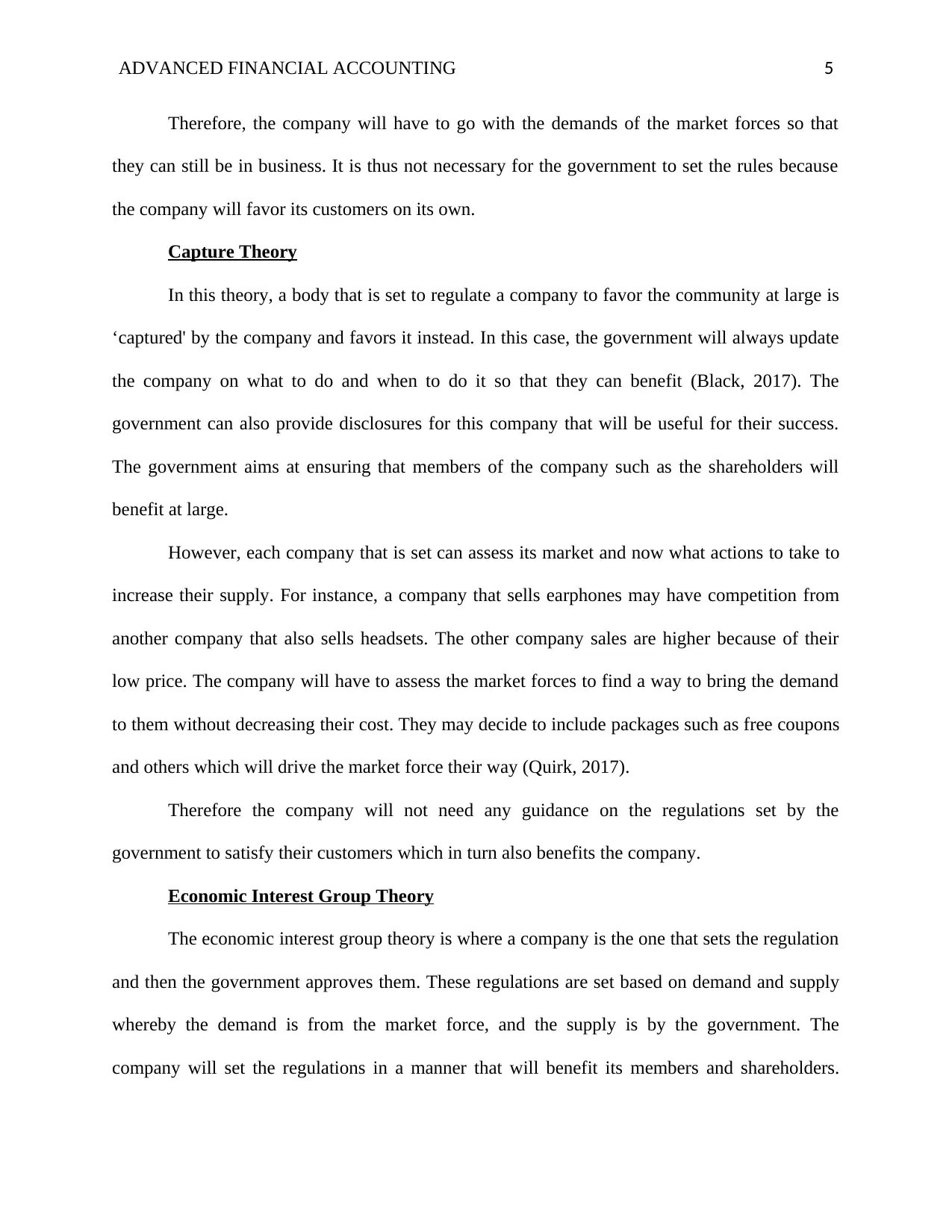
ADVANCED FINANCIAL ACCOUNTING 5
Therefore, the company will have to go with the demands of the market forces so that
they can still be in business. It is thus not necessary for the government to set the rules because
the company will favor its customers on its own.
Capture Theory
In this theory, a body that is set to regulate a company to favor the community at large is
‘captured' by the company and favors it instead. In this case, the government will always update
the company on what to do and when to do it so that they can benefit (Black, 2017). The
government can also provide disclosures for this company that will be useful for their success.
The government aims at ensuring that members of the company such as the shareholders will
benefit at large.
However, each company that is set can assess its market and now what actions to take to
increase their supply. For instance, a company that sells earphones may have competition from
another company that also sells headsets. The other company sales are higher because of their
low price. The company will have to assess the market forces to find a way to bring the demand
to them without decreasing their cost. They may decide to include packages such as free coupons
and others which will drive the market force their way (Quirk, 2017).
Therefore the company will not need any guidance on the regulations set by the
government to satisfy their customers which in turn also benefits the company.
Economic Interest Group Theory
The economic interest group theory is where a company is the one that sets the regulation
and then the government approves them. These regulations are set based on demand and supply
whereby the demand is from the market force, and the supply is by the government. The
company will set the regulations in a manner that will benefit its members and shareholders.
Therefore, the company will have to go with the demands of the market forces so that
they can still be in business. It is thus not necessary for the government to set the rules because
the company will favor its customers on its own.
Capture Theory
In this theory, a body that is set to regulate a company to favor the community at large is
‘captured' by the company and favors it instead. In this case, the government will always update
the company on what to do and when to do it so that they can benefit (Black, 2017). The
government can also provide disclosures for this company that will be useful for their success.
The government aims at ensuring that members of the company such as the shareholders will
benefit at large.
However, each company that is set can assess its market and now what actions to take to
increase their supply. For instance, a company that sells earphones may have competition from
another company that also sells headsets. The other company sales are higher because of their
low price. The company will have to assess the market forces to find a way to bring the demand
to them without decreasing their cost. They may decide to include packages such as free coupons
and others which will drive the market force their way (Quirk, 2017).
Therefore the company will not need any guidance on the regulations set by the
government to satisfy their customers which in turn also benefits the company.
Economic Interest Group Theory
The economic interest group theory is where a company is the one that sets the regulation
and then the government approves them. These regulations are set based on demand and supply
whereby the demand is from the market force, and the supply is by the government. The
company will set the regulations in a manner that will benefit its members and shareholders.
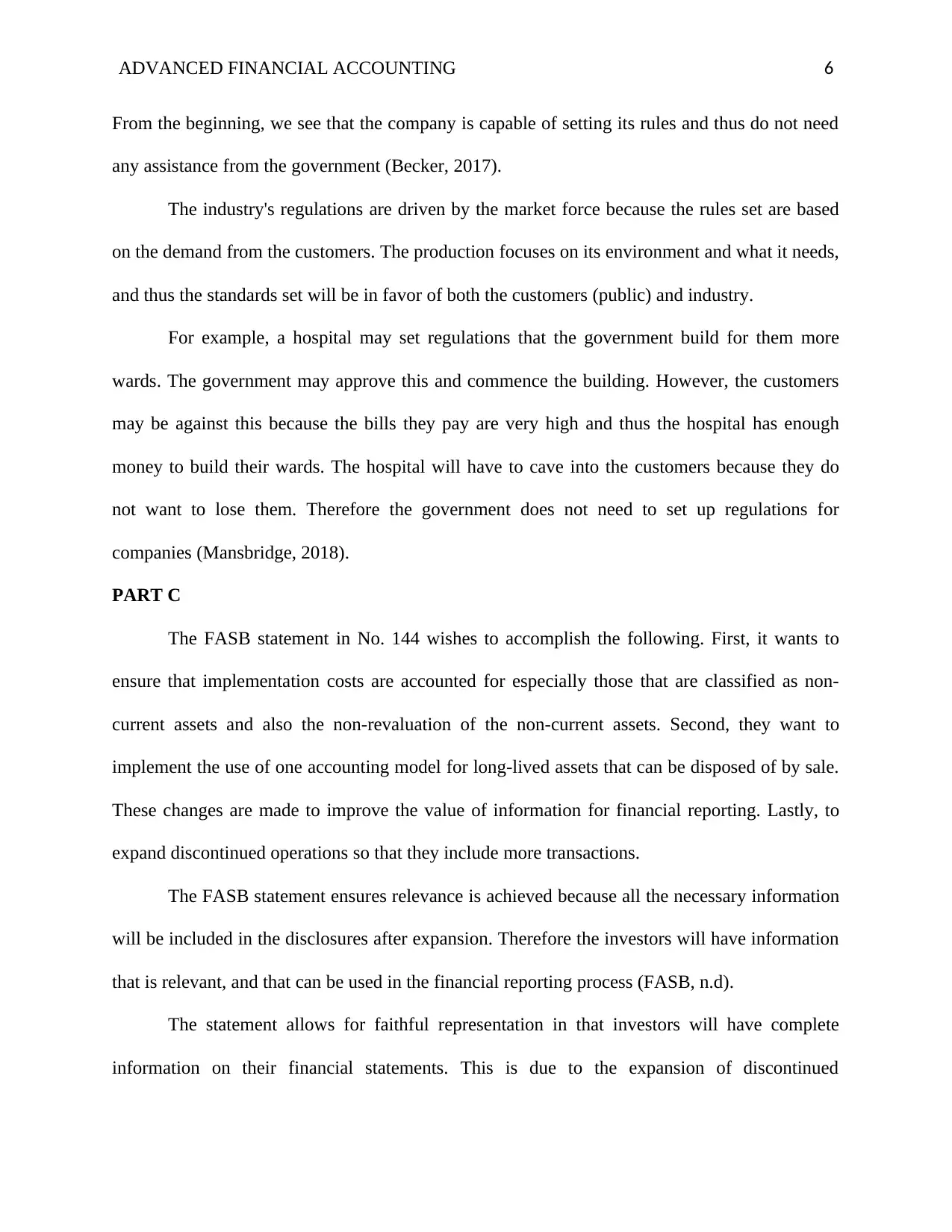
ADVANCED FINANCIAL ACCOUNTING 6
From the beginning, we see that the company is capable of setting its rules and thus do not need
any assistance from the government (Becker, 2017).
The industry's regulations are driven by the market force because the rules set are based
on the demand from the customers. The production focuses on its environment and what it needs,
and thus the standards set will be in favor of both the customers (public) and industry.
For example, a hospital may set regulations that the government build for them more
wards. The government may approve this and commence the building. However, the customers
may be against this because the bills they pay are very high and thus the hospital has enough
money to build their wards. The hospital will have to cave into the customers because they do
not want to lose them. Therefore the government does not need to set up regulations for
companies (Mansbridge, 2018).
PART C
The FASB statement in No. 144 wishes to accomplish the following. First, it wants to
ensure that implementation costs are accounted for especially those that are classified as non-
current assets and also the non-revaluation of the non-current assets. Second, they want to
implement the use of one accounting model for long-lived assets that can be disposed of by sale.
These changes are made to improve the value of information for financial reporting. Lastly, to
expand discontinued operations so that they include more transactions.
The FASB statement ensures relevance is achieved because all the necessary information
will be included in the disclosures after expansion. Therefore the investors will have information
that is relevant, and that can be used in the financial reporting process (FASB, n.d).
The statement allows for faithful representation in that investors will have complete
information on their financial statements. This is due to the expansion of discontinued
From the beginning, we see that the company is capable of setting its rules and thus do not need
any assistance from the government (Becker, 2017).
The industry's regulations are driven by the market force because the rules set are based
on the demand from the customers. The production focuses on its environment and what it needs,
and thus the standards set will be in favor of both the customers (public) and industry.
For example, a hospital may set regulations that the government build for them more
wards. The government may approve this and commence the building. However, the customers
may be against this because the bills they pay are very high and thus the hospital has enough
money to build their wards. The hospital will have to cave into the customers because they do
not want to lose them. Therefore the government does not need to set up regulations for
companies (Mansbridge, 2018).
PART C
The FASB statement in No. 144 wishes to accomplish the following. First, it wants to
ensure that implementation costs are accounted for especially those that are classified as non-
current assets and also the non-revaluation of the non-current assets. Second, they want to
implement the use of one accounting model for long-lived assets that can be disposed of by sale.
These changes are made to improve the value of information for financial reporting. Lastly, to
expand discontinued operations so that they include more transactions.
The FASB statement ensures relevance is achieved because all the necessary information
will be included in the disclosures after expansion. Therefore the investors will have information
that is relevant, and that can be used in the financial reporting process (FASB, n.d).
The statement allows for faithful representation in that investors will have complete
information on their financial statements. This is due to the expansion of discontinued
⊘ This is a preview!⊘
Do you want full access?
Subscribe today to unlock all pages.

Trusted by 1+ million students worldwide
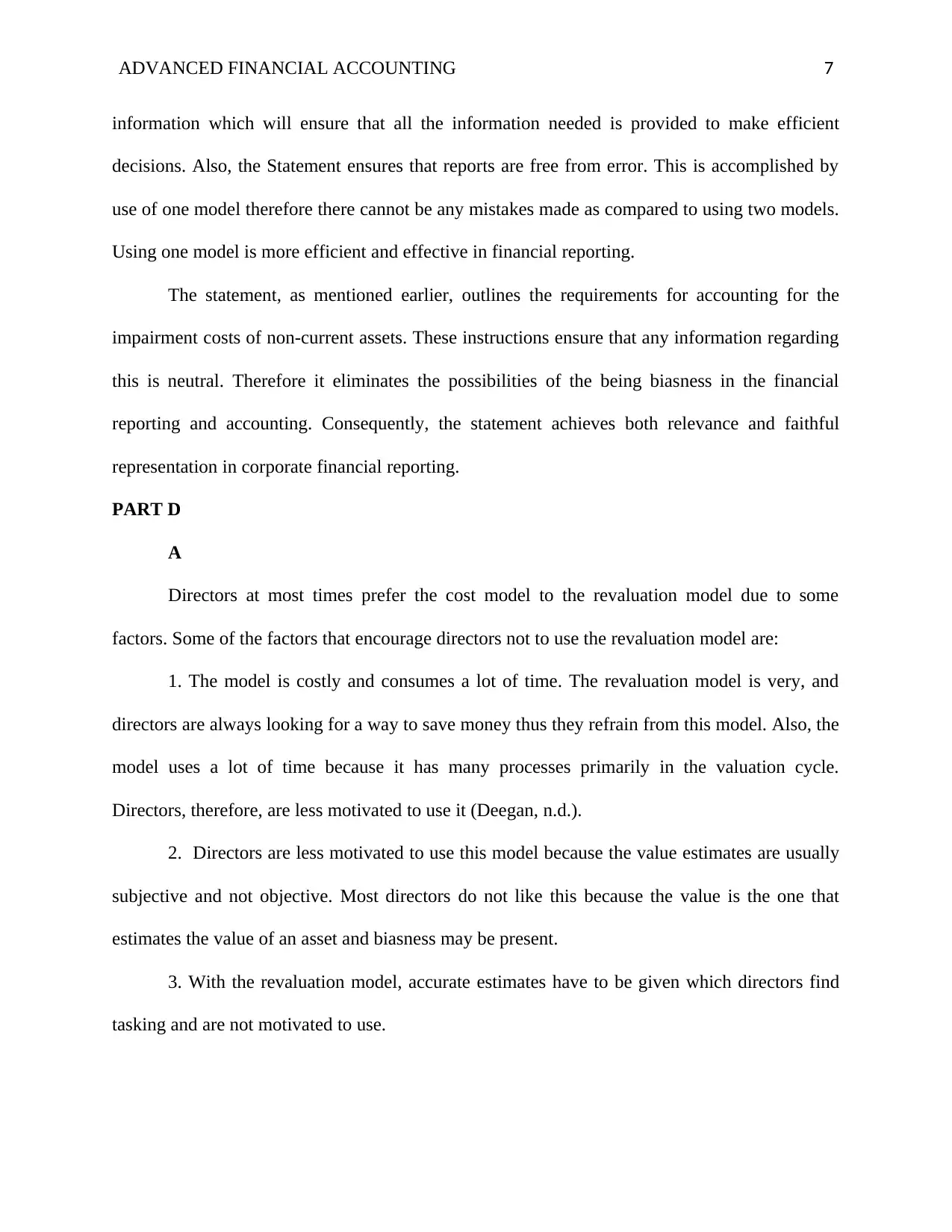
ADVANCED FINANCIAL ACCOUNTING 7
information which will ensure that all the information needed is provided to make efficient
decisions. Also, the Statement ensures that reports are free from error. This is accomplished by
use of one model therefore there cannot be any mistakes made as compared to using two models.
Using one model is more efficient and effective in financial reporting.
The statement, as mentioned earlier, outlines the requirements for accounting for the
impairment costs of non-current assets. These instructions ensure that any information regarding
this is neutral. Therefore it eliminates the possibilities of the being biasness in the financial
reporting and accounting. Consequently, the statement achieves both relevance and faithful
representation in corporate financial reporting.
PART D
A
Directors at most times prefer the cost model to the revaluation model due to some
factors. Some of the factors that encourage directors not to use the revaluation model are:
1. The model is costly and consumes a lot of time. The revaluation model is very, and
directors are always looking for a way to save money thus they refrain from this model. Also, the
model uses a lot of time because it has many processes primarily in the valuation cycle.
Directors, therefore, are less motivated to use it (Deegan, n.d.).
2. Directors are less motivated to use this model because the value estimates are usually
subjective and not objective. Most directors do not like this because the value is the one that
estimates the value of an asset and biasness may be present.
3. With the revaluation model, accurate estimates have to be given which directors find
tasking and are not motivated to use.
information which will ensure that all the information needed is provided to make efficient
decisions. Also, the Statement ensures that reports are free from error. This is accomplished by
use of one model therefore there cannot be any mistakes made as compared to using two models.
Using one model is more efficient and effective in financial reporting.
The statement, as mentioned earlier, outlines the requirements for accounting for the
impairment costs of non-current assets. These instructions ensure that any information regarding
this is neutral. Therefore it eliminates the possibilities of the being biasness in the financial
reporting and accounting. Consequently, the statement achieves both relevance and faithful
representation in corporate financial reporting.
PART D
A
Directors at most times prefer the cost model to the revaluation model due to some
factors. Some of the factors that encourage directors not to use the revaluation model are:
1. The model is costly and consumes a lot of time. The revaluation model is very, and
directors are always looking for a way to save money thus they refrain from this model. Also, the
model uses a lot of time because it has many processes primarily in the valuation cycle.
Directors, therefore, are less motivated to use it (Deegan, n.d.).
2. Directors are less motivated to use this model because the value estimates are usually
subjective and not objective. Most directors do not like this because the value is the one that
estimates the value of an asset and biasness may be present.
3. With the revaluation model, accurate estimates have to be given which directors find
tasking and are not motivated to use.
Paraphrase This Document
Need a fresh take? Get an instant paraphrase of this document with our AI Paraphraser
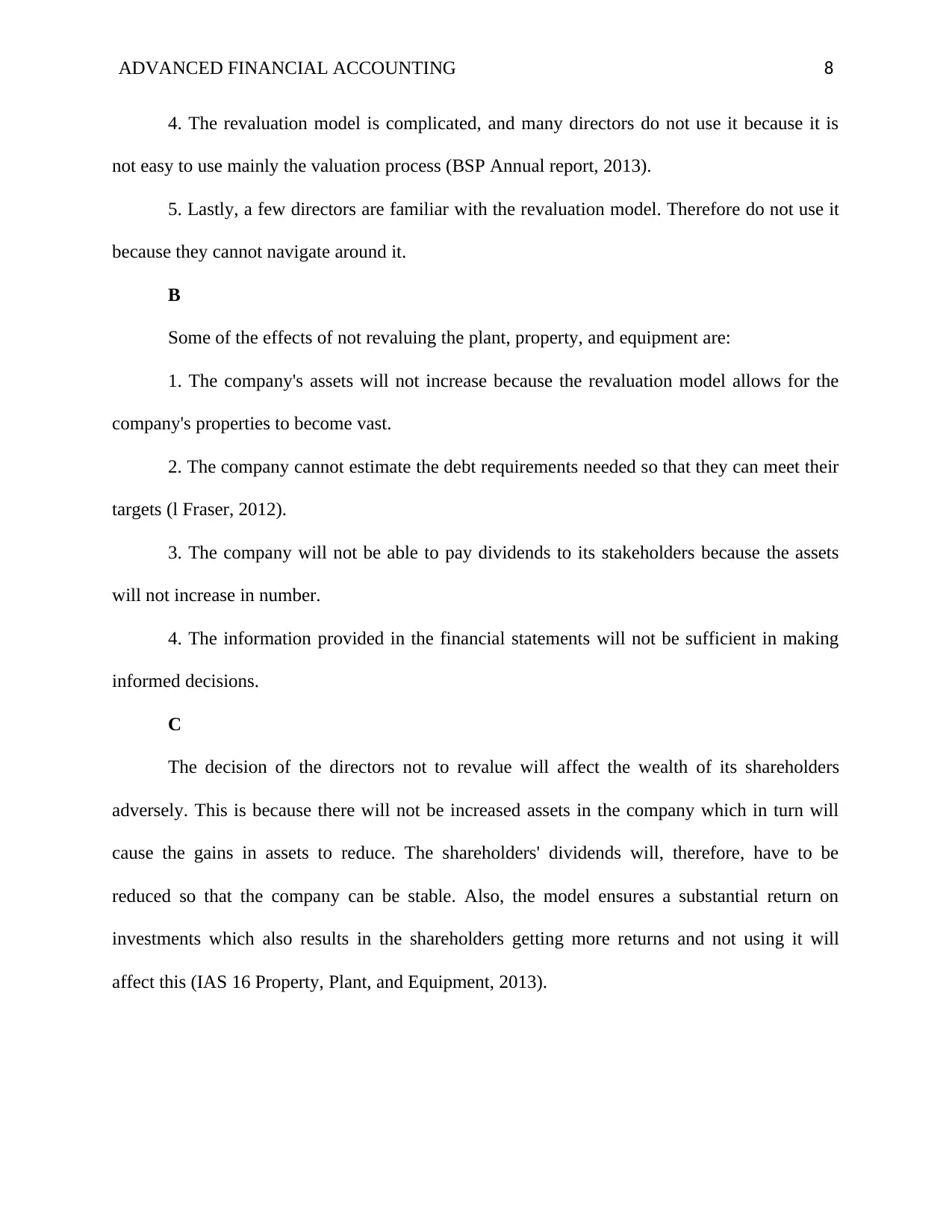
ADVANCED FINANCIAL ACCOUNTING 8
4. The revaluation model is complicated, and many directors do not use it because it is
not easy to use mainly the valuation process (BSP Annual report, 2013).
5. Lastly, a few directors are familiar with the revaluation model. Therefore do not use it
because they cannot navigate around it.
B
Some of the effects of not revaluing the plant, property, and equipment are:
1. The company's assets will not increase because the revaluation model allows for the
company's properties to become vast.
2. The company cannot estimate the debt requirements needed so that they can meet their
targets (l Fraser, 2012).
3. The company will not be able to pay dividends to its stakeholders because the assets
will not increase in number.
4. The information provided in the financial statements will not be sufficient in making
informed decisions.
C
The decision of the directors not to revalue will affect the wealth of its shareholders
adversely. This is because there will not be increased assets in the company which in turn will
cause the gains in assets to reduce. The shareholders' dividends will, therefore, have to be
reduced so that the company can be stable. Also, the model ensures a substantial return on
investments which also results in the shareholders getting more returns and not using it will
affect this (IAS 16 Property, Plant, and Equipment, 2013).
4. The revaluation model is complicated, and many directors do not use it because it is
not easy to use mainly the valuation process (BSP Annual report, 2013).
5. Lastly, a few directors are familiar with the revaluation model. Therefore do not use it
because they cannot navigate around it.
B
Some of the effects of not revaluing the plant, property, and equipment are:
1. The company's assets will not increase because the revaluation model allows for the
company's properties to become vast.
2. The company cannot estimate the debt requirements needed so that they can meet their
targets (l Fraser, 2012).
3. The company will not be able to pay dividends to its stakeholders because the assets
will not increase in number.
4. The information provided in the financial statements will not be sufficient in making
informed decisions.
C
The decision of the directors not to revalue will affect the wealth of its shareholders
adversely. This is because there will not be increased assets in the company which in turn will
cause the gains in assets to reduce. The shareholders' dividends will, therefore, have to be
reduced so that the company can be stable. Also, the model ensures a substantial return on
investments which also results in the shareholders getting more returns and not using it will
affect this (IAS 16 Property, Plant, and Equipment, 2013).
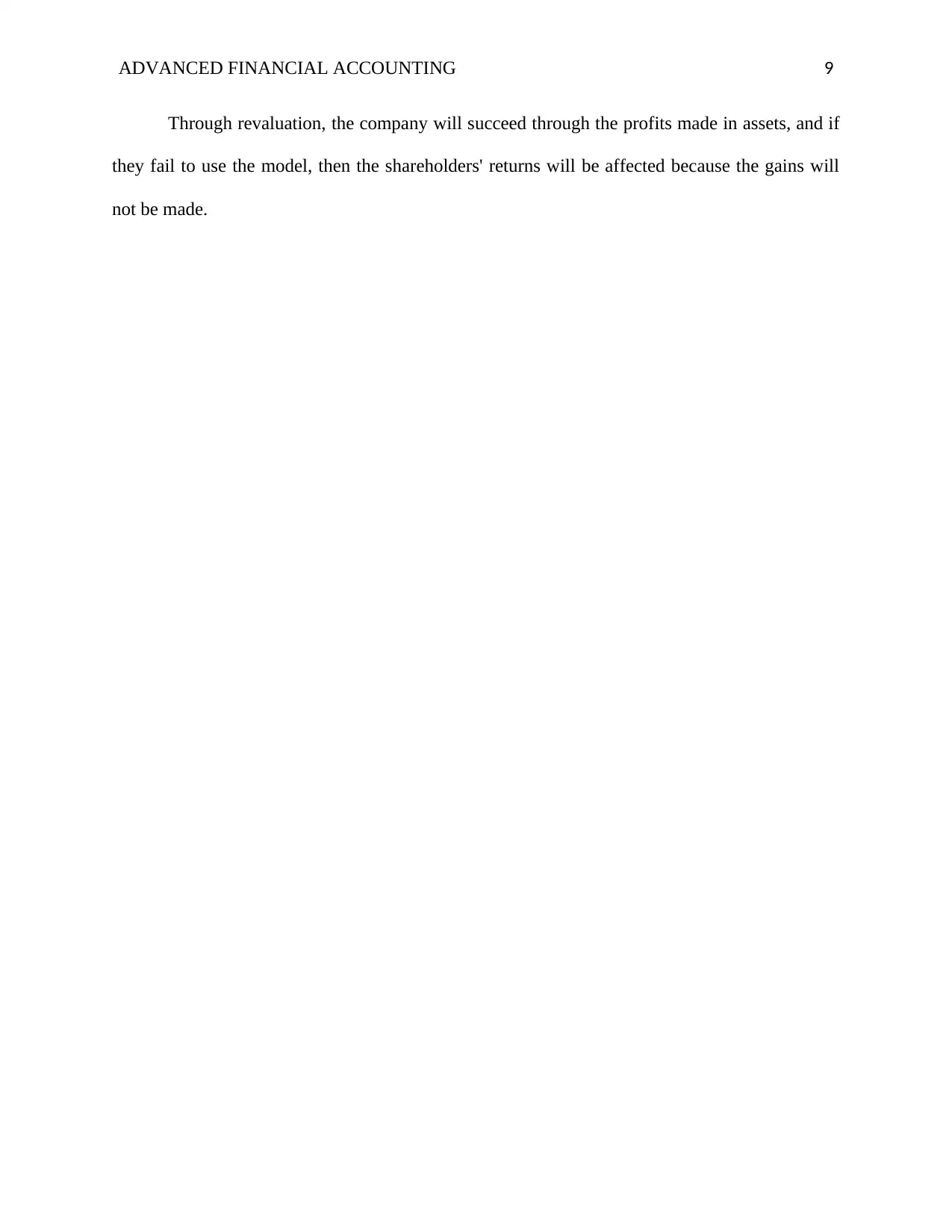
ADVANCED FINANCIAL ACCOUNTING 9
Through revaluation, the company will succeed through the profits made in assets, and if
they fail to use the model, then the shareholders' returns will be affected because the gains will
not be made.
Through revaluation, the company will succeed through the profits made in assets, and if
they fail to use the model, then the shareholders' returns will be affected because the gains will
not be made.
⊘ This is a preview!⊘
Do you want full access?
Subscribe today to unlock all pages.

Trusted by 1+ million students worldwide
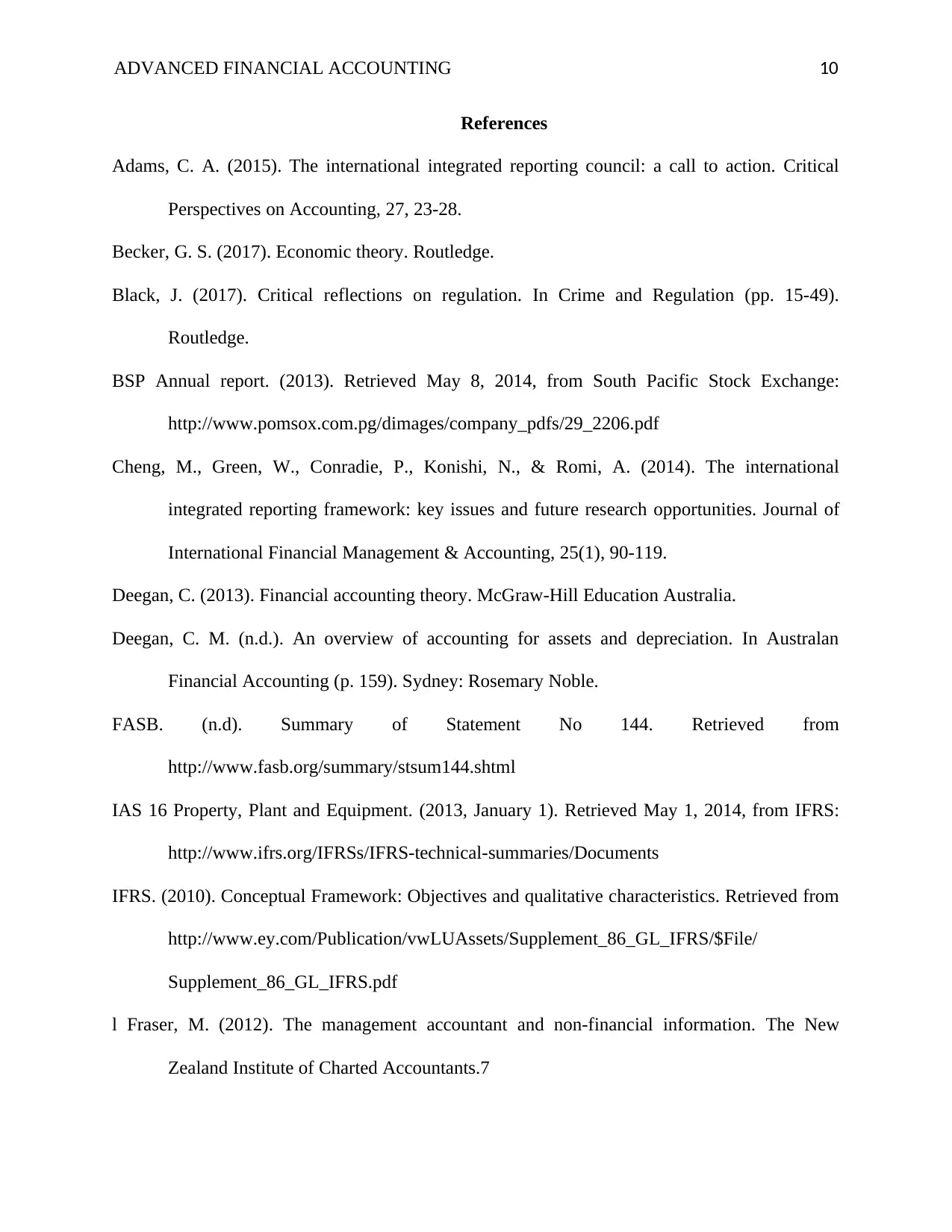
ADVANCED FINANCIAL ACCOUNTING 10
References
Adams, C. A. (2015). The international integrated reporting council: a call to action. Critical
Perspectives on Accounting, 27, 23-28.
Becker, G. S. (2017). Economic theory. Routledge.
Black, J. (2017). Critical reflections on regulation. In Crime and Regulation (pp. 15-49).
Routledge.
BSP Annual report. (2013). Retrieved May 8, 2014, from South Pacific Stock Exchange:
http://www.pomsox.com.pg/dimages/company_pdfs/29_2206.pdf
Cheng, M., Green, W., Conradie, P., Konishi, N., & Romi, A. (2014). The international
integrated reporting framework: key issues and future research opportunities. Journal of
International Financial Management & Accounting, 25(1), 90-119.
Deegan, C. (2013). Financial accounting theory. McGraw-Hill Education Australia.
Deegan, C. M. (n.d.). An overview of accounting for assets and depreciation. In Australan
Financial Accounting (p. 159). Sydney: Rosemary Noble.
FASB. (n.d). Summary of Statement No 144. Retrieved from
http://www.fasb.org/summary/stsum144.shtml
IAS 16 Property, Plant and Equipment. (2013, January 1). Retrieved May 1, 2014, from IFRS:
http://www.ifrs.org/IFRSs/IFRS-technical-summaries/Documents
IFRS. (2010). Conceptual Framework: Objectives and qualitative characteristics. Retrieved from
http://www.ey.com/Publication/vwLUAssets/Supplement_86_GL_IFRS/$File/
Supplement_86_GL_IFRS.pdf
l Fraser, M. (2012). The management accountant and non-financial information. The New
Zealand Institute of Charted Accountants.7
References
Adams, C. A. (2015). The international integrated reporting council: a call to action. Critical
Perspectives on Accounting, 27, 23-28.
Becker, G. S. (2017). Economic theory. Routledge.
Black, J. (2017). Critical reflections on regulation. In Crime and Regulation (pp. 15-49).
Routledge.
BSP Annual report. (2013). Retrieved May 8, 2014, from South Pacific Stock Exchange:
http://www.pomsox.com.pg/dimages/company_pdfs/29_2206.pdf
Cheng, M., Green, W., Conradie, P., Konishi, N., & Romi, A. (2014). The international
integrated reporting framework: key issues and future research opportunities. Journal of
International Financial Management & Accounting, 25(1), 90-119.
Deegan, C. (2013). Financial accounting theory. McGraw-Hill Education Australia.
Deegan, C. M. (n.d.). An overview of accounting for assets and depreciation. In Australan
Financial Accounting (p. 159). Sydney: Rosemary Noble.
FASB. (n.d). Summary of Statement No 144. Retrieved from
http://www.fasb.org/summary/stsum144.shtml
IAS 16 Property, Plant and Equipment. (2013, January 1). Retrieved May 1, 2014, from IFRS:
http://www.ifrs.org/IFRSs/IFRS-technical-summaries/Documents
IFRS. (2010). Conceptual Framework: Objectives and qualitative characteristics. Retrieved from
http://www.ey.com/Publication/vwLUAssets/Supplement_86_GL_IFRS/$File/
Supplement_86_GL_IFRS.pdf
l Fraser, M. (2012). The management accountant and non-financial information. The New
Zealand Institute of Charted Accountants.7
Paraphrase This Document
Need a fresh take? Get an instant paraphrase of this document with our AI Paraphraser
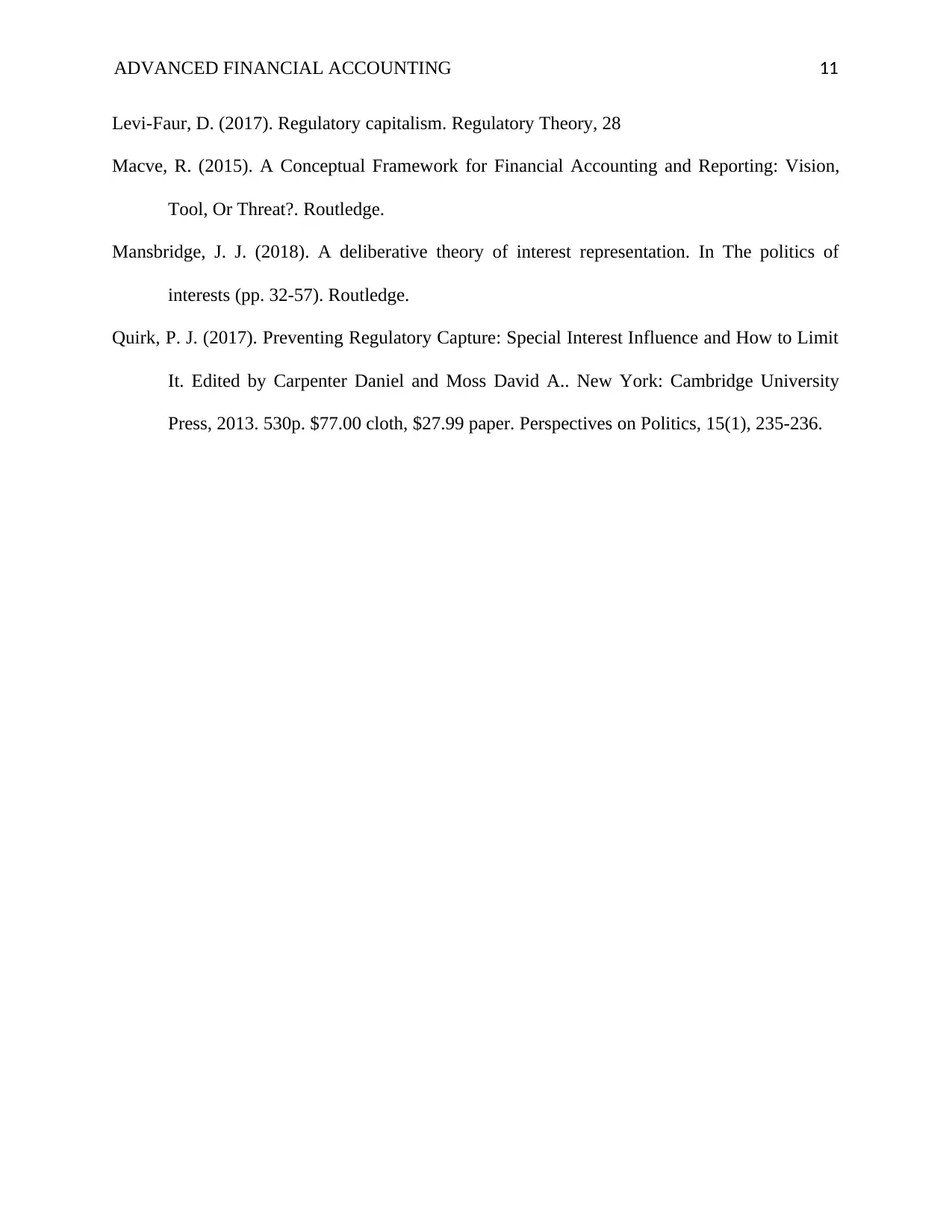
ADVANCED FINANCIAL ACCOUNTING 11
Levi-Faur, D. (2017). Regulatory capitalism. Regulatory Theory, 28
Macve, R. (2015). A Conceptual Framework for Financial Accounting and Reporting: Vision,
Tool, Or Threat?. Routledge.
Mansbridge, J. J. (2018). A deliberative theory of interest representation. In The politics of
interests (pp. 32-57). Routledge.
Quirk, P. J. (2017). Preventing Regulatory Capture: Special Interest Influence and How to Limit
It. Edited by Carpenter Daniel and Moss David A.. New York: Cambridge University
Press, 2013. 530p. $77.00 cloth, $27.99 paper. Perspectives on Politics, 15(1), 235-236.
Levi-Faur, D. (2017). Regulatory capitalism. Regulatory Theory, 28
Macve, R. (2015). A Conceptual Framework for Financial Accounting and Reporting: Vision,
Tool, Or Threat?. Routledge.
Mansbridge, J. J. (2018). A deliberative theory of interest representation. In The politics of
interests (pp. 32-57). Routledge.
Quirk, P. J. (2017). Preventing Regulatory Capture: Special Interest Influence and How to Limit
It. Edited by Carpenter Daniel and Moss David A.. New York: Cambridge University
Press, 2013. 530p. $77.00 cloth, $27.99 paper. Perspectives on Politics, 15(1), 235-236.
1 out of 11
Related Documents
Your All-in-One AI-Powered Toolkit for Academic Success.
+13062052269
info@desklib.com
Available 24*7 on WhatsApp / Email
![[object Object]](/_next/static/media/star-bottom.7253800d.svg)
Unlock your academic potential
Copyright © 2020–2026 A2Z Services. All Rights Reserved. Developed and managed by ZUCOL.




